Micro-Star International Co (MSI, 微星科技), which makes gaming computers, graphics cards and motherboards, is forecast to see revenue fall this quarter from last quarter due to supply tightness and seasonality, Credit Suisse Group AG said on Thursday.
The COVID-19 pandemic has caused an increase in orders due to work-from-home demand, leading to supply shortages.
Many components, especially central processing units, graphics processing units (GPUs), panels, driver ICs and power management ICs, are in short supply, analysts said.

Photo: CNA
MSI’s sales are forecast to decline 2.47 percent quarterly to NT$39.75 billion (US$1.38 billion) in the October-to-December period as component constraints would likely affect the company’s computer and graphics card sales, while its motherboard business might slow down due to seasonal factors, Credit Suisse said in a note.
Sales would also come under pressure as Nvidia Corp’s new Ampere-architecture GPU faces wafer production issues, it said.
“We previously expected MSI’s system and graphics card sales could further grow in the fourth quarter, as we believe new-generation GPU platform migration should provide further uplift to its gaming-centric business,” Credit Suisse analysts led by Jerry Su (蘇厚合) wrote in the note.
“However, the 8-inch wafer constraint and display tightness could impact MSI’s system shipments in the quarter, while graphics card momentum is also facing some bottleneck given Nvidia’s new GPUs are apparently having wafer foundry production issues,” they said.
MSI’s gross margin is expected to slide to 15.4 percent, from 15.8 percent in the third quarter, due to a change in its product mix, Credit Suisse said.
Higher logistics and transportation costs could remain a burden amid the pandemic and lower MSI’s operating margin to 7.3 percent, from 7.5 percent, it said.
Earnings per share are projected to fall to NT$2.97 from last quarter’s NT$3.09, it said.
MSI last week reported net profit of NT$2.61 billion for the third quarter, up 24.4 percent from the previous quarter and 52.58 percent from a year earlier.
Last quarter’s net profit marked the highest for a single quarter in the company’s history.
Revenue rose 15.33 percent quarter-on-quarter and 24.2 percent year-on-year to NT$40.76 billion, thanks to rush orders for PCs due to stay-at-home and teleworking demand.
In the first three quarters of this year, net profit totaled NT$5.97 billion, or earnings per share of NT$7.06, up 39.6 percent from a year earlier.
MSI has seen robust orders since June, with monthly revenue hovering at about NT$13.2 billion to NT$13.8 billion. Its cumulative revenue in the first 10 months of this year reached NT$118.44 billion, an annual increase of 18.13 percent.
The 8-inch wafer constraint and GPU tightness might push the company’s orders from this quarter to next year and support its sales momentum in the first half of next year, Credit Suisse said.
However, its sales outlook remains unclear for the second half of next year.
“Overall notebook shipments should be difficult to further grow in 2021, after a higher 2020 base, while graphics card sales could continue to grow on new product launches,” Credit Suisse said.

GROWING OWINGS: While Luxembourg and China swapped the top three spots, the US continued to be the largest exposure for Taiwan for the 41st consecutive quarter The US remained the largest debtor nation to Taiwan’s banking sector for the 41st consecutive quarter at the end of September, after local banks’ exposure to the US market rose more than 2 percent from three months earlier, the central bank said. Exposure to the US increased to US$198.896 billion, up US$4.026 billion, or 2.07 percent, from US$194.87 billion in the previous quarter, data released by the central bank showed on Friday. Of the increase, about US$1.4 billion came from banks’ investments in securitized products and interbank loans in the US, while another US$2.6 billion stemmed from trust assets, including mutual funds,

AI TALENT: No financial details were released about the deal, in which top Groq executives, including its CEO, would join Nvidia to help advance the technology Nvidia Corp has agreed to a licensing deal with artificial intelligence (AI) start-up Groq, furthering its investments in companies connected to the AI boom and gaining the right to add a new type of technology to its products. The world’s largest publicly traded company has paid for the right to use Groq’s technology and is to integrate its chip design into future products. Some of the start-up’s executives are leaving to join Nvidia to help with that effort, the companies said. Groq would continue as an independent company with a new chief executive, it said on Wednesday in a post on its Web

Even as the US is embarked on a bitter rivalry with China over the deployment of artificial intelligence (AI), Chinese technology is quietly making inroads into the US market. Despite considerable geopolitical tensions, Chinese open-source AI models are winning over a growing number of programmers and companies in the US. These are different from the closed generative AI models that have become household names — ChatGPT-maker OpenAI or Google’s Gemini — whose inner workings are fiercely protected. In contrast, “open” models offered by many Chinese rivals, from Alibaba (阿里巴巴) to DeepSeek (深度求索), allow programmers to customize parts of the software to suit their

JOINT EFFORTS: MediaTek would partner with Denso to develop custom chips to support the car-part specialist company’s driver-assist systems in an expanding market MediaTek Inc (聯發科), the world’s largest mobile phone chip designer, yesterday said it is working closely with Japan’s Denso Corp to build a custom automotive system-on-chip (SoC) solution tailored for advanced driver-assistance systems and cockpit systems, adding another customer to its new application-specific IC (ASIC) business. This effort merges Denso’s automotive-grade safety expertise and deep vehicle integration with MediaTek’s technologies cultivated through the development of Media- Tek’s Dimensity AX, leveraging efficient, high-performance SoCs and artificial intelligence (AI) capabilities to offer a scalable, production-ready platform for next-generation driver assistance, the company said in a statement yesterday. “Through this collaboration, we are bringing two